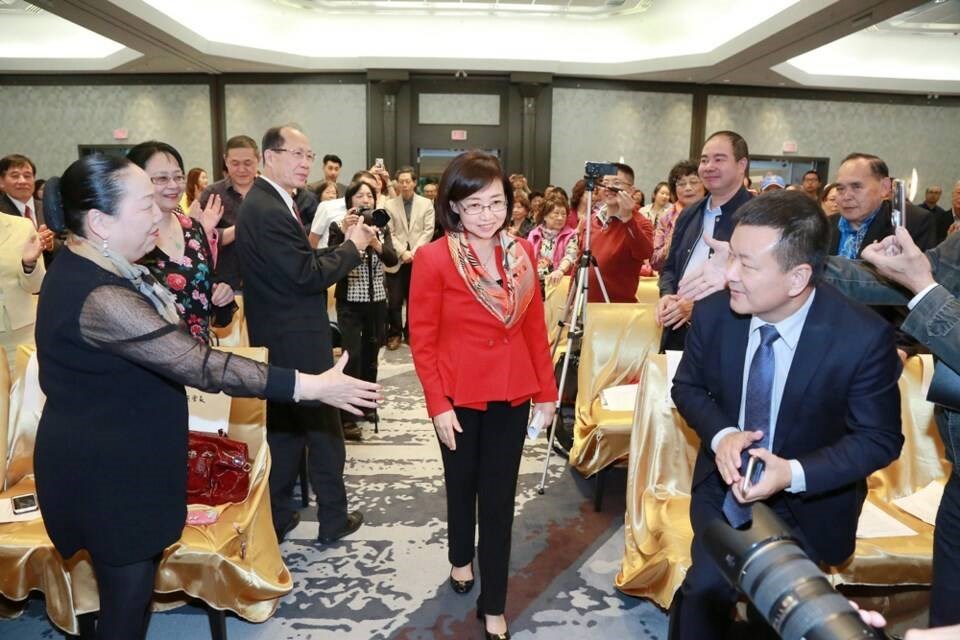Supreme Court of B.C. Justice Neena Sharma has ruled there is not enough evidence an $887,562 cheque cashed from former lawyer Hong Guo’s trust account was forged as part of an alleged $6.6-million fraud scheme that’s resulted in years of complex, intertwined litigation, including disbarment proceedings.
Sharma ruled against Guo’s application for a summary judgment against Bank of Montreal (BMO) that would have let Guo and her now-shuttered law firm off the hook for repaying the bank, which is suing Guo via a counterclaim.
Sharma’s June 27 ruling outlines the extraordinary litigation saga, first noting the fraud scheme as alleged by Guo, a former Richmond mayoral candidate who is now in China with a warrant for her arrest should she return to Canada for matters largely unrelated to the case at hand.
Guo alleged her bookkeeper and office manager Zixin Li and conveyancing clerk Qian Pan misappropriated over $6.6 million from Guo Law Corporation, between February 2016 and April 2016.
Guo told the court she went on vacation and left blank trust account cheques in Li’s possession. But Sharma noted the Law Society of BC confirmed Guo left signed blank trust account cheques — one of several instances of professional misconduct that led to Guo’s second disbarment, last January.
Pan allegedly went on to cash numerous cheques and bank drafts into her BMO account, with assistance from Li, Sharma explained.
Sharma heard testimony from BMO employee Ivan Lee, who described how he verified Pan’s deposits, including confirming their authenticity by calling the law firm’s accounts payable department, as well as Li.
Also roped into the case is co-defendant Gateway Casinos and Entertainment Ltd. That is because Pan allegedly took the money from BMO and cashed bank drafts at the casino.
Pan told bank employee Lee, as summarized by Sharma, “that her family was selling numerous properties in Richmond and moving the funds to China. She also said the outgoing drafts were payable to Gateway because she believed the casino was able to wire the funds to China at a reduced cost.”
On March 29, 2016, Lee filed an unusual activity report, suspecting money laundering, Sharma noted.
While Pan was allegedly largely successful at withdrawing money from Guo’s CIBC trust account at first, CIBC refused to honour the contentious $887,562 cheque that BMO had already processed.
Guo initially sued Pan and Li, forming the foundation of this case, in which she is represented by Gerry Cuttler of Cuttler and Company. Guo later added the banks and casino to her claim.
In January 2021, a default judgment was issued against Li, Sharma noted.
However, because BMO didn’t get its money from CIBC, BMO countersued Guo, claiming she and her firm were responsible for the alleged fraud.
In turn, Guo claimed BMO was responsible for cashing the cheque, which Guo claims contained a forged signature.
In asking for a summary judgment, Guo was asking for Sharma to determine that the evidence (such as the forgery) is indisputable, and no trial is required.
But Sharma ruled Guo’s case for summary judgment to be flawed in many respects.
“In August 2016, Ms. Guo made an affidavit in the NW Action stating her signature on numerous cheques was forged by Mr. Li. However, she later admitted to the Law Society that she left Mr. Li with a number of blank cheques that she had signed, which included cheques she had previously sworn bore her forged signature. In those circumstances, it would be imprudent for this Court to accept her bald statement that Cheque 1117 bears a forged signature,” wrote Sharma, who also noted no expert evidence was properly submitted by Guo.
BMO contends it acted in good faith and couldn’t have reasonably been aware of the alleged fraud. In legal terms, BMO said it was a “holder in due course.”
On this point, Sharma also ruled that this evidence is disputable and more suitable for a trial.
Guo’s testimony was further questioned by Sharma, who noted Guo was found to have lied to the law society.
“Ms. Guo deposed that she discovered the misappropriation ‘on or about’ April 1, 2016.
“Leaving aside the fact how problematic it is that Ms. Guo cannot be precise about the day she discovered two of her employees stole over $6.6 million from her law firm’s trust account, I cannot agree it is ‘beyond doubt’ that BMO had notice of that scheme at the time when Ms. Guo herself did not.
“I again rely on my concerns about accepting Ms. Guo’s evidence about the very matters for which she was disbarred,” wrote Sharma.
Guo claims to have helped prosecute Li and Pan in China
After news of the alleged trust account fraud broke, Guo claimed in media to have a bustling business, handling $600 million in annual transactions largely centred on property conveyancing and business acquisitions for wealthy Chinese immigrants.
Guo advertised her practice as having been a former legal specialist for the State Council of the People’s Republic of China, the executive branch of the National People’s Congress run by the Chinese Communist Party.
Last December, Guo issued an via Clearway Law, claiming she assisted Chinese police to arrest and prosecute Li and Pan, despite no assistance or corroborating evidence from the RCMP. Guo claims Li was sentenced to 13 years in prison and Pan was sentenced to 15 years.
Among the nine law society citations against Guo since September 2018, (the first time) involved a complex set of business transactions whereby Guo was found to have inserted herself into legal proceedings of her clients from China.
Guo was ruled “ungovernable” in hearings and claimed the law society was discriminating against her because she was Chinese.
Those transactions have led to civil proceedings against Guo, who has been found in contempt of court. Guo left Canada for China in September and has not returned. She has an outstanding arrest warrant.
Her law office, which is insolvent, was in May.




